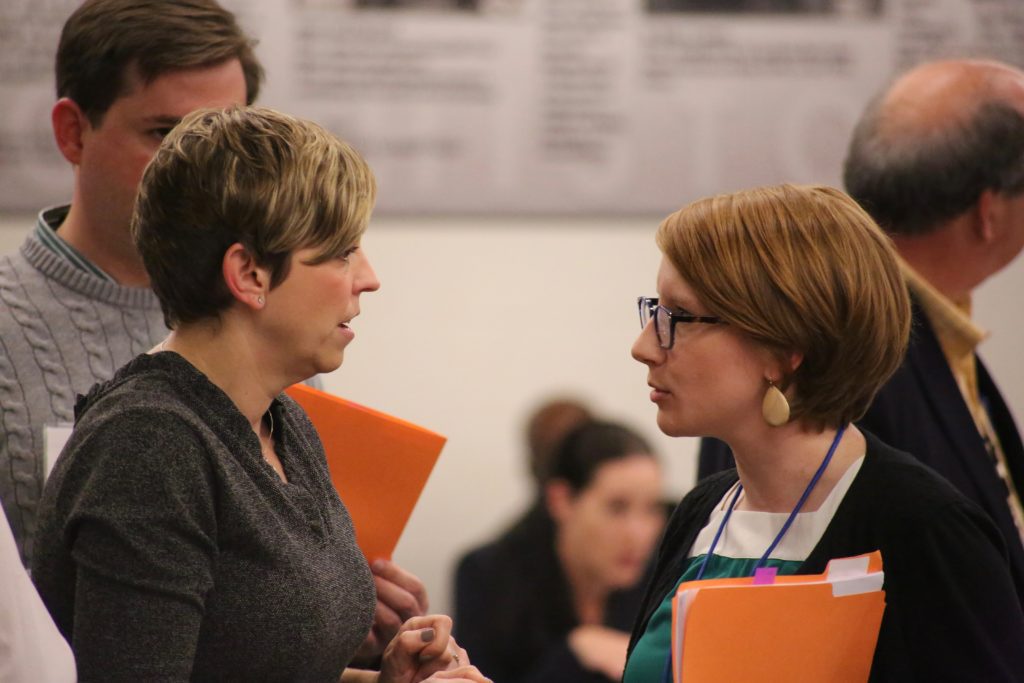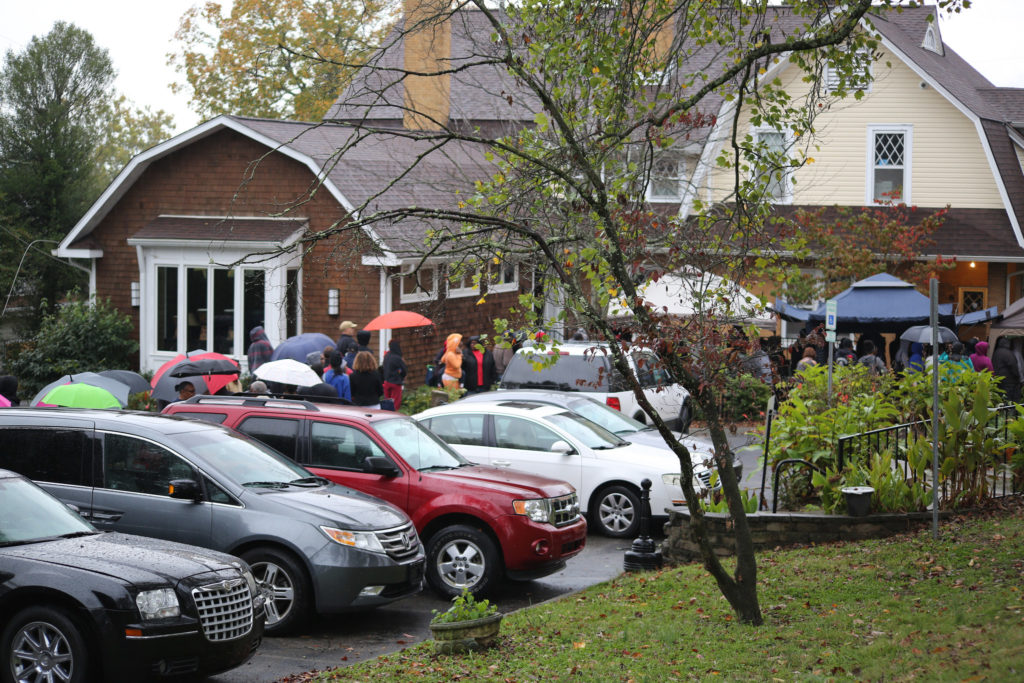On a cool fall morning outside the Beck Cultural Exchange Center in east Knoxville, a line of more than 150 people stand in the rain.
It’s a Saturday. With nearly 200 additional people already inside the building that commemorates the city’s African-American history, the line moves slowly.
Occasionally, a man with a booming voice emerges to instruct those waiting to have their forms completed and ready for review once they step inside.
Most of those standing in the line are African-American. Most have faced challenges in dealing with the legal system. None of them can afford to hire a lawyer. But all have the goal of improving their lives by removing, or in legal terms – “expunging,” minor offenses from their criminal records.
For some, even dismissed charges have interfered with their ability to land a job, secure housing, pursue education, or obtain a professional license.
It is for those people that the University of Tennessee Legal Clinic organized this event.
***
Michael Goins has faced a number of challenges in his life, and he doesn’t deny his past. Alcohol, anger mismanagement, and jealousy fueled him to run afoul of the law when he was younger, he says.
His frustration with the legal system peaked while he was serving in the military. It’s then that his sister was killed in what was described as an accidental shooting. No arrests were made, but the circumstances left Goins believing there was more to the story. The now 50-year-old man says he didn’t cope well.
“No denying it, I had an anger problem. I ended up with post-traumatic stress,” he said. “When alcohol was involved, it was worse.”
Goins, who accepts responsibility for the crimes he committed and the legal difficulties that ensued, says as an African-American male he was representative of what so many others face.
“I think people get aggravated with the system because they get tired of hearing no,” Goins said. “People don’t know what to do. They don’t want to go to the court house to take care of their problems even when they should.”
Goins says he was the epitome of those who become caught in a legal system.
“I always could find a restaurant job,” he said. “They’re easy to get. And I figured if I worked a night job, I wouldn’t get in to trouble. But I couldn’t ever get to the place I wanted to be.”
***
I think people get aggravated with the system because they get tired of hearing no.

During the six years Joy Radice has worked with the UT Legal Clinic, the law professor has met hundreds of people with stories similar to Goins’.
In Tennessee, it’s not easy for individuals to overcome their connections to minor criminal activity – even when they’re innocent. Tennessee is one of as many as 40 states that does not automatically remove offenses from the criminal records of individuals who’ve been charged but not convicted of a crime. As a result, those who have been arrested but not convicted face unique and devastating challenges. Their dismissed charges can prevent them from getting a job or renting an apartment because employers and landlord see the initial charges.
“There is no automatic expungement of record in Tennessee, even for those whose charges are dismissed,” Radice said. “While we are one of a minority of states that actually has a substantive expungement law on the books, it’s a difficult process to navigate.
“The law is detailed, and it’s confusing. People need lawyers to help them figure out what is eligible and what it not. But lawyers can charge over $300 to help people file even the most basic expungement petitions, which many cannot afford,” Radice said.
In order for individuals to clear that criminal record, a petition must be filed with the court requesting that the charges be expunged. The request is then reviewed by the district attorney’s office and ultimately signed by a judge.
Tennessee legislators have amended the expungement law in recent years to broaden its application. The law originally applied only to those with dismissed cases and then to those with a single, non-violent criminal conviction. But now the statute allows for the expungement of two low-level criminal offenses if five years have passed since the sentence was served and other conditions are met.
Even with those changes, the $475 filing costs associated with expunging a diversion and the $280 filing fee for expunging a conviction can be the obstacle that prevents some individuals from being able to restore their privileges and quality of life.
Knox County Deputy District Attorney Kyle Hixson says he would like to see further revision to the Tennessee law.
“The expungement fee for a diverted case that results in a dismissal is currently almost twice as much as the fee for expunging a criminal conviction,” Hixson said. “If fiscally possible, it seems like these fees should be reversed.”
***
Since the UT Legal Clinic’s work with expungement clients began three years ago, the process has evolved.
Knox County now offers expungement screening at the state courthouse twice a week to help those in need “cut through the red tape of the cumbersome expungement process,” Hixson said, and the faculty and students of the UT Legal clinic are important partners in that work.
“District attorneys are statutorily required to process expungement applications, but we do not receive additional staff allocations to help with this considerable workload. Further, indigent petitioners are not eligible to receive court-appointed lawyers to assist with the expungement process,” he said.
Students and faculty at the College of Law fill “these gaps by providing crucial assistance to those seeking expungement,” he said. “Expungement court has been a great success, due in large part to the hard work of the students and faculty from the College of Law who staff it alongside our prosecutors and clerks.”
The Saturday expungement clinics like that at the Beck Center, which take place once or twice annually, go a step further by conducting hearings with judges on site.
The October event at the Beck Center was a collaboration of the UT Legal Clinic, the Beck Cultural Exchange Center, Community-Step Up, and Vet to Vet Tennessee that that brought together judges, clerks, and attorneys to assist the community.
There is no automatic expungement of record in Tennessee, even for those whose charges are dismissed.
Knox County General Sessions Judge Chuck Cerny and City Court Judge John Rosson, Jr. heard the cases, Knox County district attorneys reviewed motions, Knox County clerks processed paperwork, and volunteer lawyers from the Community Law Office and the Knoxville Bar Association worked alongside UT’s student attorneys to present the motions.
In advance of the clinic, UT Legal Clinic students researched clients’ cases to determine eligibility. The students fielded over 500 phone calls on the UT Expungement Hotline from those with questions and prepared files for those who received services. If the students determined a client was eligible for expungement, the students – under the guidance of faculty – counseled the clients and prepared files for the Saturday clinic.
“Our students do some very thorough interviewing and counseling with clients. They learn how to explain the law and how it applies to an individual’s criminal record in a way that’s clear. They learn how to interpret a very dense statute. They learn how to draft motions, make legal arguments, and file petitions to expunge eligible charges,” Radice said. “They work at a very intense level.”
Those in Tennessee’s rural communities have particular need of the UT Legal Clinic’s expungement services because there are often too few attorneys available to address the need, and because those who are eligible for expungement are unaware of the possibilities. Radice said the UT Legal Clinic is continuing to expand its effort and do more to serve rural populations.
In April 2017, the UT Legal Clinic – in conjunction with the Knoxville Bar Association and the Tennessee Faith and Justice Alliance – held a one-day clinic at the Rutledge Baptist Church in Grainger County to assist nearly 50 people. Later this spring, the UT Legal Clinic will conduct another Saturday morning expungement clinic at the First Baptist Church in Madisonville.
***
First-year College of Law student Liz Peterson didn’t approach her experience with the expungement clinic with naiveté.
She’s 50 years old, white, married with children, and a Presbyterian Church pastor to a predominantly African-American congregation in downtown Knoxville. But she was surprised by the extreme level of need she encountered through her day of service at the Beck Center.
“Some people there hadn’t had a driver’s license in over 20 years,” she said. “Some of them were looking at $800 to $1,000 fees to get their licenses back.”

“After one woman had seen the judge and had her record expunged, she literally danced out of the building,” Peterson said. “We called it the expungement dance.”
Goins recalls the exhilaration he felt after he met Radice in 2015.
“Joy and the legal clinic gave me a sense of hope,” he said. “I didn’t have that before.”
Goins’ life has changed dramatically in the last three years because of his determination and the legal assistance he has received. Instead of working late shifts at restaurants, he now produces video content for a local community access television program. He also assists non-profit groups throughout Knoxville in organizing and promoting their events.
“I’m a different person now,” he said.
Peterson said the clinic helped affirm what she already believed, that you have to know a system well in order to help people effectively navigate it. She was also struck by how the College of Law faculty and students, Knoxville and Knox County legal professionals, and community service groups came together to serve the community.
“It made me more sure that this is the right thing to do with my life,” she said. “I like being on the right side of change.”
